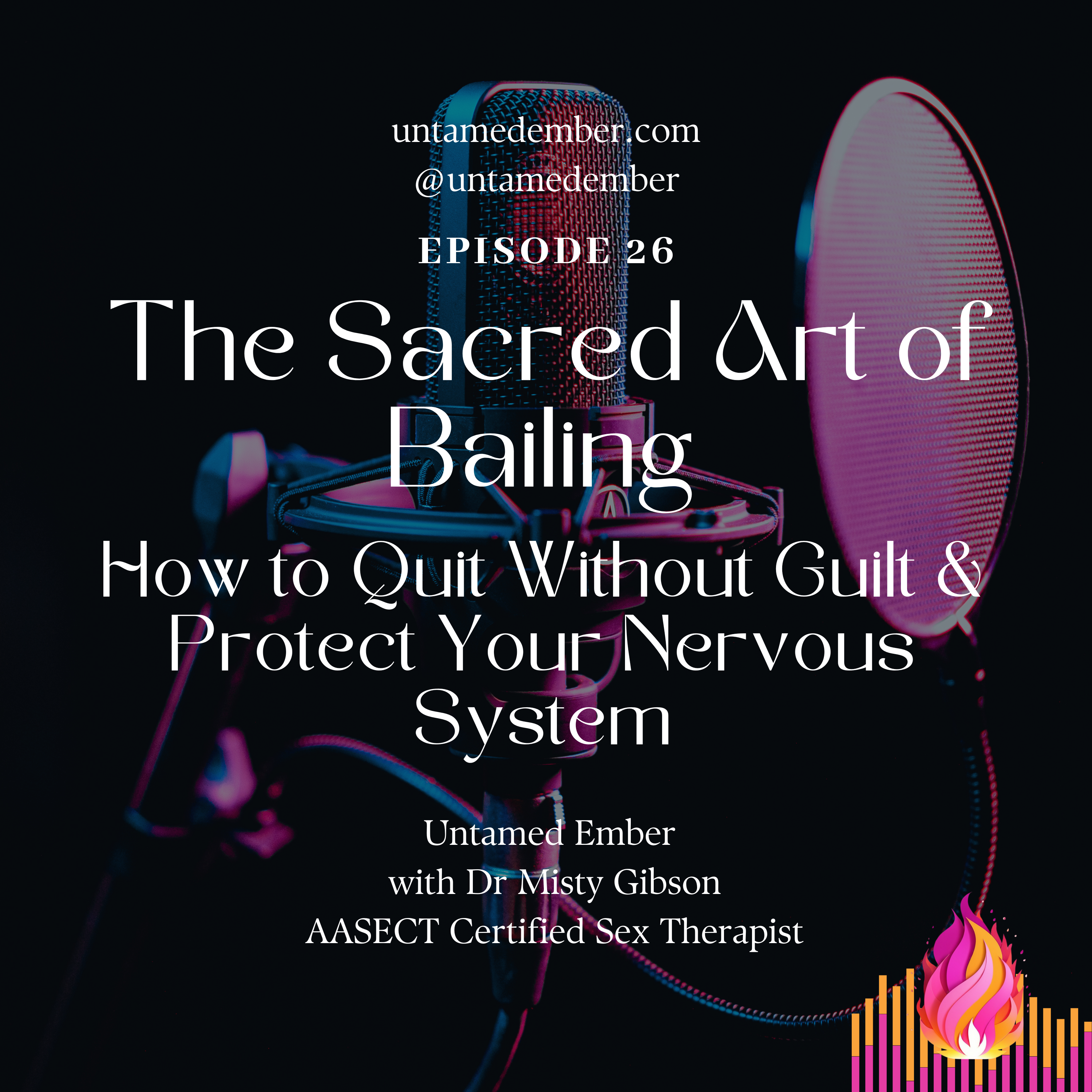Episode Transcript
[00:00:00] Picture this. You're sitting in your car outside that social event you committed to three weeks ago. Your hands are gripping the steering wheel so tight your knuckles are white. Your stomach is doing backflips like an Olympic gymnast having a breakdown.
[00:00:15] Every fiber of your being is screaming, abort mission. While your brain is running that familiar guilt loop. I should go in. I said I would. People are expecting me. What if they think I'm flaky? What if they never invite me again? Meanwhile, your nervous system is staging a full revolt. Your heart is racing, your palms are sweating, and you feel like you might actually vomit on your dashboard if you have to walk through those doors. Does that sound familiar? What if I told you that the voice screaming at you to turn around and drive home isn't weakness, it's wisdom?
[00:00:50] What if your guilt about bailing isn't moral clarity, its internalized capitalism trying to keep you compliant? Hey there, rebels and nervous system revolutionaries. This is Dr. Misty with Untamed Ember. And today we're talking about the most radical act of self preservation. You've never been taught the sacred art of strategic abandonment. That's right. We're going full throttle on validating your right to quit. Shit that hurts your nervous system.
[00:01:21] Because here's what I know. After years of working with neurodivergent queer and trauma impacted folks, your body's refusal to show up for things that dysregulate you isn't a character flaw. It's intelligence. It's your nervous system doing exactly what it evolved to do. Protect you from harm.
[00:01:40] So today we're dismantling the mythology that commitment equals moral worth. We're exploring the neuroscience of why saying no literally rewires your brain for agency. And we're getting practical about how to bail gracefully, unapologetically, and without drowning in guilt. Because here's the truth that no productivity guru wants you to know. Sometimes the most revolutionary thing you can do is simply refuse to stay where you don't belong. If you've ever felt like your nervous system is more trustworthy than social expectations, this episode is your permission slip to honor that wisdom. Let's dive in. Let's start by calling bullshit on one of the most toxic myths we've all been fed.
[00:02:28] That your worth as a human being is measured by your ability to follow through on every commitment, regardless of the cost to your nervous system.
[00:02:37] This isn't just personal failing or individual weakness. This is systemic conditioning designed to keep marginalized bodies available for exploitation. Think about it. From the time we're kids we get the message that good people follow through winners never quit. Your word is your bond.
[00:02:56] And if you struggle with this, well, clearly you lack character, discipline or moral fiber. But here's what they don't tell you. This commitment culture assumes everyone starts with the same baseline capacity, the same sensory tolerance, the same nervous system regulation.
[00:03:14] It assumes that what feels manageable for a neurotypical, non traumatized person in a stable environment should feel manageable for everyone.
[00:03:22] That's not just wrong, it's ableist. For my neurodivergent folks listening, you know exactly what I'm talking about. You've been paying what I call the neurodivergent tax on every social interaction since you were old enough to mask that tax. Looks like these the energy drain of constantly translating neurotypical social cues while suppressing your natural responses. The sensory overload of environments that feel like assault to your nervous system but are considered normal to everyone else. The executive function exhaustion of managing all the unspoken rules and expectations that nobody thought to teach you explicitly.
[00:04:03] By the time you show up to that commitment you made three weeks ago, you're already running on empty. But commitment culture doesn't account for that. It just sees your struggle and calls it fl. For trauma survivors, this gets even more insidious. Because trauma teaches your nervous system that saying no isn't safe, that your boundaries don't matter, that other people's comfort is more important than your survival.
[00:04:28] So you develop fawn through obligations, saying yes to things that make your skin crawl. Because the alternative feels like abandonment or rejection.
[00:04:38] You become available for everyone else's needs while completely disconnecting from your own.
[00:04:44] And here's the kicker. This isn't just about individual healing. This is about how systems of oppression use guilt and obligation to keep marginalized people compliant and depleted. Think about who gets called reliable in our culture and who gets called flaky. Think about whose boundaries are respected and whose are labeled as high maintenance or difficult.
[00:05:07] Your nervous system doesn't give a fuck about your reputation. It cares about your survival. And when it's telling you to leave or to quit or to abandon ship, that's not moral failing. That's biological wisdom.
[00:05:21] So what's actually happening in your body when obligation becomes oppression? Let's get into the neuroscience.
[00:05:28] Here's what I want you to understand about your nervous system. It's not trying to sabotage your social life or make you seem unreliable. It's doing a job it evolved to do over millions of years. Keep you alive by detecting and avoiding threat.
[00:05:44] When you committed to that thing three weeks ago. Maybe your nervous system was in a different state. Maybe you were feeling regulated, connected, optimistic. Your ventral vagal system was online, and that commitment felt totally doable. But nervous system states are fluid. They change based on stress, sleep hormones, life events and a thousand other variables. So by the time the commitment rolls around, you might be operating from a completely different neurobiological place.
[00:06:14] Let's break this down through the lens of your window of tolerance. That zone where your nervous system feels safe enough to function without either shutting down or going into overdrive.
[00:06:26] When you're inside your window of tolerance, you can handle the sensory input of social situations. You can regulate your emotions. You can think clearly and respond flexibly to whatever comes up. Commitments feel manageable because your nervous system has the bandwidth to handle them. But trauma, chronic stress, neurodivergence, and systemic oppression can shrink that window dramatically. Instead of having a wide, spacious range where you can roll with life's demands, you get stuck on a tightrope where the slightest wobble sends you into dysregulation. When a commitment pushes you outside your window, your nervous system has two main responses. First, there's hyperarousal. That anxious, wired, I can't do this spiral. Your sympathetic nervous system kicks in with all the classic fight or flight symptoms. Racing heart, shallow breath, muscle tension. Mental chatter that won't quit. You might find yourself obsessively planning escape routes or catastrophizing about all the ways the situation could go wrong. Then there's hypoarousal, that numb, disconnected. I guess I'll just go through the motions. Collapse. Your dorsal vagal system shuts you down. As a protective mechanism, you might show up to that commitment physically. But emotionally and energetically, you're completely offline. You're running on autopilot, while your consciousness floats somewhere near the ceiling. Neither of these states is sustainable and neither serves you or anyone else involved. But here's what's fascinating. Your nervous system starts giving you signals long before you hit full dysregulation. The problem is, most of us have been taught to ignore these signals or interpret them as weakness. Let me give you some examples of your nervous system's quit signals.
[00:08:17] Physically, you might notice nausea when you think about that commitment. Headaches that mysteriously appear right before you're supposed to leave the house. Muscle tension that no amount of stretching seems to fix. Fatigue, that sleep doesn't touch.
[00:08:33] Emotionally, there's that sense of dread that settles in your chest. Resentment that builds every time you think about following through. A feeling of Being trapped or suffocated by your own commitments.
[00:08:45] Cognitively, you might find yourself unable to focus on anything else, obsessively planning ways to get out of it, or experiencing decision paralysis around the simplest details. Behaviorally, you start procrastinating on anything related to the commitment. You forget to RSVP or show up late, hoping the event will already be over.
[00:09:08] You find yourself getting sick right before you're supposed to follow through. These aren't character flaws. These are your nervous system's way of communicating. This doesn't feel safe right now.
[00:09:19] And here's the revolutionary part. When you honor these signals by strategically abandoning commitments that dysregulate you, you're literally rewiring your brain for agency. You're strengthening the neural pathways associated with self advocacy and boundary setting. Every time you choose your nervous system's wisdom over social expectations, you're practicing a skill that most of us were never taught, the ability to prioritize your own well being without drowning in guilt. This is neuroplasticity in action. Your brain is learning that it's safe to have boundaries, safe to say no, safe to disappoint people when the alternative is self abandonment. Your nervous system's refusal to comply isn't a bug, it's a feature. It's your body's radical resistance to systems that demand your depletion.
[00:10:12] So now that we understand the biology, let's get practical. How do we actually implement the sacred art of strategic abandonment? Understanding the neuroscience is great, but you still need to know how to actually extract yourself from situations that are dysregulating your nervous system without destroying relationships or drowning in guilt.
[00:10:33] First, let's talk about the somatic check in process. This is your early warning system for avoiding commitments that will push you outside of your window of tolerance.
[00:10:43] Before you say yes to anything, and I mean anything, pause and ask your body, how does this feel? Not your mind, which is probably running calculations about whether you should want to do this thing. Your body.
[00:10:56] Place one hand on your chest, one hand on your belly and take a few breaths. And then imagine yourself at the event, in that commitment, doing the thing.
[00:11:05] What happens in your body? Does your breathing get shallow? Do your shoulders creep up towards your ears? Does your stomach clench or your jaw tighten?
[00:11:13] Does energy drain out of you like someone pulled a plug? Or do you feel expansion? Does your breath deepen? Do you feel energized or curious or excited?
[00:11:23] Your body knows before your mind catches up. Trust that intelligence.
[00:11:28] But what about when you've already committed and you're Realizing that this might have been a mistake. What about when you're sitting in that car outside the event, hands shaking, knowing you can't do this, but feeling trapped by your own word.
[00:11:42] Let me give you some exit strategies, organized by situation.
[00:11:46] For social events, you have what I call the holy trinity of strategic abandonment. There's the Irish goodbye. You just leave.
[00:11:55] No explanations, no dramatic announcements. You slip out quietly when no one's looking.
[00:12:01] This works especially well for larger gatherings where your absence won't immediately shut down the party. There's the strategic ailment. I. I'm not feeling well and I need to head home. This isn't lying. If your nervous system dysregulation is making you genuinely feel unwell. And here's the thing, you don't owe anyone a detailed medical history. Not feeling well is a complete explanation. And then there's what I call the truth bomb. This isn't working for my nervous system tonight, and I need to go take care of myself. This one requires more confidence, but it's surprisingly effective because it's so honest that people often don't know how to argue with it. For work situations, the language gets more formal, but the principle is still the same.
[00:12:45] Instead of I can't handle this, try. I don't have the bandwidth for this project right now. Instead of this job is making me question my existence, try. I'm exploring opportunities that are a better fit for my professional goals. You're not lying. You're translating your nervous system's wisdom into language that protects you while maintaining professional relationships.
[00:13:08] But here's the crucial part. You don't have to explain yourself into the ground. One of the biggest mistakes people make when setting boundaries is over justifying them. I can't come because I'm tired and I had a really long week and I know I said I would, but I'm just not feeling social. And I promise I'm not mad at anyone. I just need some alone time, and I hope you understand.
[00:13:31] Stop. Just stop.
[00:13:33] I can't make it tonight. It's a complete sentence. I need to cancel doesn't require a dissertation on why.
[00:13:40] The more you explain, the more you invite negotiation and the weaker your boundary becomes. For my neurodivergent folks, you might need some additional strategies. Your nervous system might need more concrete, specific plans, because uncertainty itself can be dysregulating.
[00:13:58] Create what I call energy budgets, literally calculating how much social, sensory, or executive function energy you have available. And don't overspend if you know you have three units of social energy. Today and that work meeting already used. Don't commit to drinks afterward just because it seems rude not to have sensory escape plans. Know where the quiet spaces are. Know where the bathrooms are. Have a friend who's prepared to be your extraction team if you text them the code word. Having a plan B makes plan A feel less threatening to your nervous system.
[00:14:37] And please, please give yourself permission to accommodate your executive function challenges. If you know you're more likely to follow through on commitments when they're in your calendar with three reminder alarms and a buddy checking in on you, set up those systems. If you know you need 48 hours to mentally prepare for social situations. Don't say yes to anything last minute. Now let's talk about relationships, because this is where strategic abandonment gets really charged.
[00:15:07] Sometimes you need to end friendships or relationships that consistently dysregulate you. Not because the person is evil, but because the dynamic is genuinely harmful to your nervous system.
[00:15:19] You're allowed to break up with people who always leave you feeling drained, anxious, or disconnected from yourself. You're allowed to set limits with family systems that demand your depletion. Just because someone is related to you doesn't mean that they have unlimited access to your energy, time or emotional labor.
[00:15:38] And you're absolutely allowed to quit relationships that exist purely out of obligation rather than genuine connection. But here comes the part that stops most people the guilt. The worry about what people will think, the fear of being seen as selfish or unreliable.
[00:15:55] Let's talk about where that guilt is really coming from and how to move through it without abandoning your boundaries.
[00:16:02] Let's get something straight. That crushing guilt you feel when you consider prioritizing your nervous system over other people's expectations? That's not your moral compass talking. That's social conditioning designed to keep you compliant.
[00:16:16] Here's where that guilt is really coming from. You've been taught from day one that your worth is tied to your productivity and availability.
[00:16:24] That good people sacrifice their own needs for others. That disappointing someone is a form of cruelty, that saying no makes you selfish. For those of us with marginalized identities, this conditioning is even more intense.
[00:16:39] Women and femmes are taught that we exist to nurture and accommodate others. People of color are punished for setting boundaries, that white people receive praise for.
[00:16:51] Disabled and neurodivergent folks are told our needs are inconvenient and our limitations are character flaws. Queer folks grew up learning that our very existence disappoints people. So we overcompensate by being endlessly available and agreeable. We learn that love is conditional on our ability to make other people comfortable with who we are. This is how systems of oppression maintain themselves. By convincing marginalized people that our survival needs are selfish demands. But here's the truth. You are not responsible for managing other people's emotions. You are not required to set yourself on fire to keep someone else warm.
[00:17:31] And your nervous system boundaries are not negotiable. When you feel guilt about protecting your own well being, that's often a trauma response. It's your system remembering times when setting boundaries led to abandonment, punishment, or rejection. Your nervous system learned that other people's comfort was more important than your safety. But that's old information. That's your past trying to protect you from dangers that may no longer exist. Let me reframe this for you. Every time you honor your nervous system's wisdom over social expectations, you're not just taking care of yourself. You're modeling healthy boundaries for everyone around you. You're giving other people permission to prioritize their own well being. You're actively dismantling toxic systems that demand our depletion. Your refusal to comply with commitments that hurt you is a revolutionary act. Think about it. What if everyone stopped showing up for things that dysregulated them? What if we all started honoring our nervous system boundaries unapologetically? The whole structure of obligation based relationships would collapse and something much healthier could emerge in its place. Here's what I want you to practice saying out loud right now. My nervous system's wisdom trumps social expectation. I am not responsible for managing other people's disqu. Quitting things that hurt me is a revolutionary act of self love.
[00:18:58] Say it until it feels true in your body, not just in your mind.
[00:19:02] And when the guilt comes up, because it will, remember this. People's disappointment in your boundaries is information about them, not you. People who are genuinely invested in your well being will understand when you need to protect your nervous system. People who get angry or manipulative when you set boundaries are revealing that they valued your compliance more than your actual personhood.
[00:19:28] You are not responsible for protecting people from the consequences of their own expectations.
[00:19:33] Here's something else to consider.
[00:19:36] What would become possible in your life if you stopped doing things that consistently dysregulated you? How much energy would you have available for the people and the activities that actually nourish you?
[00:19:48] Most of us are so busy meeting obligations that we never wanted that we have no bandwidth left for the things that actually bring us joy, connection, and aliveness.
[00:19:58] Strategic abandonment isn't just about what you're saying no to, it's about what you're saying yes to. It's about reclaiming your time and energy for the relationships and experiences that genuinely feed your soul. And sometimes disappointing people is the kindest thing you can do.
[00:20:15] Because showing up while dysregulated, performing engagement, you don't feel going through the motions while emotionally checked out. That's not actually giving anyone your best.
[00:20:26] That's giving them your performance of your best while slowly eroding your own capacity for genuine connection. People deserve your authentic presence, not your martyrdom. And you deserve relationships that can handle your honest limitations.
[00:20:42] So this week, I want you to practice one act of strategic abandonment. Start small if you need to. Cancel plans that fill you with dread. Leave an event early. When your nervous system starts screaming, say no to something that you would normally force yourself through. Notice the guilt that comes up. Try to breathe through it. And remember that guilt is not evidence that you're doing anything wrong. It's evidence that you're breaking patterns that were never meant to serve you. As we wrap up today's exploration of strategic abandonment, I want to bring us back to the image I started with you sitting in your car outside that commitment, engine running, hands shaking.
[00:21:23] Except now you have permission to turn around and go home.
[00:21:27] Now you understand that your body's refusal isn't weakness, it's intelligence. Your nervous system isn't trying to sabotage your social life. It's trying to preserve your sanity. Your guilt about disappointing people isn't moral clarity. It's conditioning that was designed to keep you compliant and available for exploitation.
[00:21:47] Here's what I want you to remember. Your nervous system's no is not a character flawless. It's a compass pointing towards liberation.
[00:21:56] Every time you honor your body's wisdom over social expectations, you're practicing a radical form of self love. You're strengthening your capacity for authentic relationships. You're dismantling systems that demand your depletion.
[00:22:11] So let me leave you with some questions to sit with this week. What are you currently doing that consistently pushes you outside of your window of tolerance?
[00:22:21] What commitments make your body contract with dread?
[00:22:24] What would become possible if you honored your nervous system's boundaries unapologetically? And here's your rebellion assignment Practice one strategic abandonment. This week, start wherever feels manageable. Cancel plans that fill you with anxiety. Leave a social event when your energy is genuinely depleted. Say no to something you would normally force yourself through.
[00:22:46] And then notice what comes up. Notice the guilt. The stories about being selfish or flaky.
[00:22:52] Remember that Your nervous system has been keeping you alive this whole time, and it knows what it's doing.
[00:22:58] If this episode hit you right in the nervous system, head over to untamed ember.kit.com to join our weekly newsletter. You'll get free resources, behind the scenes content, and bonus podcast episodes delivered straight to your inbox. And don't forget to subscribe to the Untamed Ember podcast wherever you listen, because your algorithm needs more radical nervous system wisdom and less wellness bullshit. Until next time, this is Dr. Misty reminding you that your nervous system's wisdom is more trustworthy than society's expectations. Your boundaries are not up for negotiation, and sometimes the most revolutionary thing you can do is simply refuse to stay where you don't belong.
[00:23:41] Keep bailing on that hurts, you rebels. Your nervous system is counting on it.




